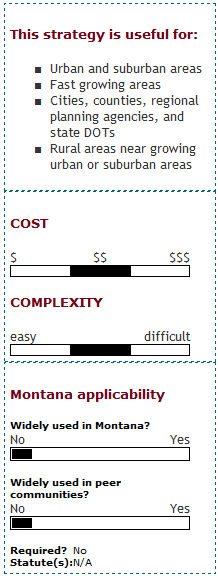

What is is DRI Review?
A Development of Regional Impact (DRI) is defined as a land use project which, due to its character, magnitude and/or location could have substantial effect on the health, safety, or welfare of citizens in a given region, often affecting more than one governmental jurisdiction. The process of DRI review is designed to assess and address the impact of these regionally significant projects on state and local infrastructure and services, including transportation facilities.
Who can implement it?
The DRI review process is typically coordinated by regional planning councils and state planning agencies, in coordination with local governments and other state agencies. In Florida and Georgia, state agencies regulate developments of regional impact through regional and state oversight. The Florida Department of Community Affairs reviews developments of regional impact for compliance with state law and to identify the regional and state impacts of large-scale developments. The department makes recommendations to local governments for approving, suggesting mitigation conditions, or not approving proposed developments. The benefit for developers of DRI projects is that the project becomes vested and approved for a period of time based on the agreed upon development order conditions.
http://www.floridajobs.org/community-planning-and-development/programs/developments-of-regional-impact-and-florida-quality-developments
A DRI alternative established by the Florida Legislature is an optional sector plan for projects that cover more than 5,000 acres. Sector plans approved through comprehensive plan amendments are initiated by the local government in agreement with the Department of Community Affairs. The sector plan addresses the conceptual, long-term build-out overlay, and detailed specific area plans. Additionally, sector plans require public participation throughout the process; emphasize urban form and the protection of regional resources and facilities.
http://www.floridajobs.org/community-planning-and-development/programs/technical-assistance/planning-initiatives/rural-planning/sector-planning-program
Similar procedures can be established for developments of county-wide or community-wide impact, where additional scrutiny is warranted due to the nature, size or location of the development. These procedures merge DRI review processes with those often in place for planned unit developments.
What are the keys to success and potential pitfalls?
Complexity of the Review Process: A DRI review can be a lengthy process that incurs costs to both developers and public agencies. Various methods to streamline the process have been explored. The Florida Quality Developments Program (see "Examples Outside Montana") was created to provide an alternative to the traditional DRI program. The intent of the program is to encourage development that has been thoughtfully planned, protects natural resources, and pays for its infrastructure. Developments that meet the Florida Quality Development standards can expect an expeditious and timely review. Unlike DRI reviews, Florida Quality Development orders are issued by the state Department of Community Affairs, not by the local government. This helps to ease the technical burden on local staff.
http://www.leg.state.fl.us/Statutes/index.cfm?App_mode=Display_Statute&Search_String=&URL=0300-0399/0380/Sections/0380.061.html
Where has this strategy been applied?
Examples in Montana
While cities and adjoining counties undoubtedly consult one another regarding development proposals, there is no formalized process for conducting development reviews on a regional basis in Montana.
Examples outside of Montana
-
Florida DRI Review Process: Pursuant to Chapter 380, Florida Statutes (FS), Regional Planning Councils are charged with the coordination of multi-jurisdictional agency review of large-scale development projects that may impact more than one county. These projects, known as Developments of Regional Impact (DRIs) are typically complex and require input from numerous reviewing agencies. Developers of major projects are required to provide additional analysis and coordinate mitigation with FDOT and any jurisdiction that may be affected by the development. Statutory changes in 2009 provide some review relief for DRI projects located in jurisdictions designated as dense urban land areas to encourage infill development and redevelopment.
The Florida Quality Developments Program (see Section 380.061, Florida Statutes) was created to provide an alternative to the traditional developments of regional impact program. To date, 18 developments have been designated as Florida Quality Developments. The developer of a Florida Quality Development is required to protect wetlands and water bodies, dunes and beaches, significant archaeological sites, areas of endangered or threatened animal species, and areas that contain endangered plant species. Other Florida Quality Development requirements include a prohibition of businesses that generate more hazardous or toxic substances than a small quantity generator; a requirement to participate in a Downtown Reuse or Redevelopment program, if appropriate; a general prohibition of dredge and fill activities; a requirement to consider open space, recreation, energy conservation and impermeable surfaces in the project design; a requirement for a development to provide all on-site and a fair-share of its off-site infrastructure needs; and a requirement to be consistent with the state comprehensive plan, state land development plan, the applicable strategic regional policy plan, and the adopted local government comprehensive plan. - Georgia DRI Review Process: The Georgia Planning Act of 1989 authorized the Department of Community Affairs (DCA) to establish procedures for review of these large-scale projects. These procedures are designed to improve communication between affected governments and to provide a means of revealing and assessing potential impacts of large-scale developments before conflicts relating to them arise. At the same time, local government autonomy is preserved since the host government maintains the authority to make the final decision on whether a proposed development will or will not go forward.
How can I get started?
- A DRI process often is created in areas where adequate public facilities ordinances/statutes apply but it is not mandatory. An implementing ordinance or statute is required and should address such items as the sizes, types and locations of developments to be subject to the process.
- Development review and approval procedures and processes, including timelines for governmental agencies and applicant; mandatory application materials including necessary data and analyses regarding impacts; inter- and intra-governmental coordination procedures.
- Mechanisms to ensure adequate infrastructure is provided or the impacts of development are mitigated.
It is recommended that the oversight or approval body be such that it has jurisdiction or authority over the entire area affected by a DRI development is encouraged, for example a regional or state agency for developments impacting more than one municipality. For this reason, getting started may first require governmental framework and policy changes.
